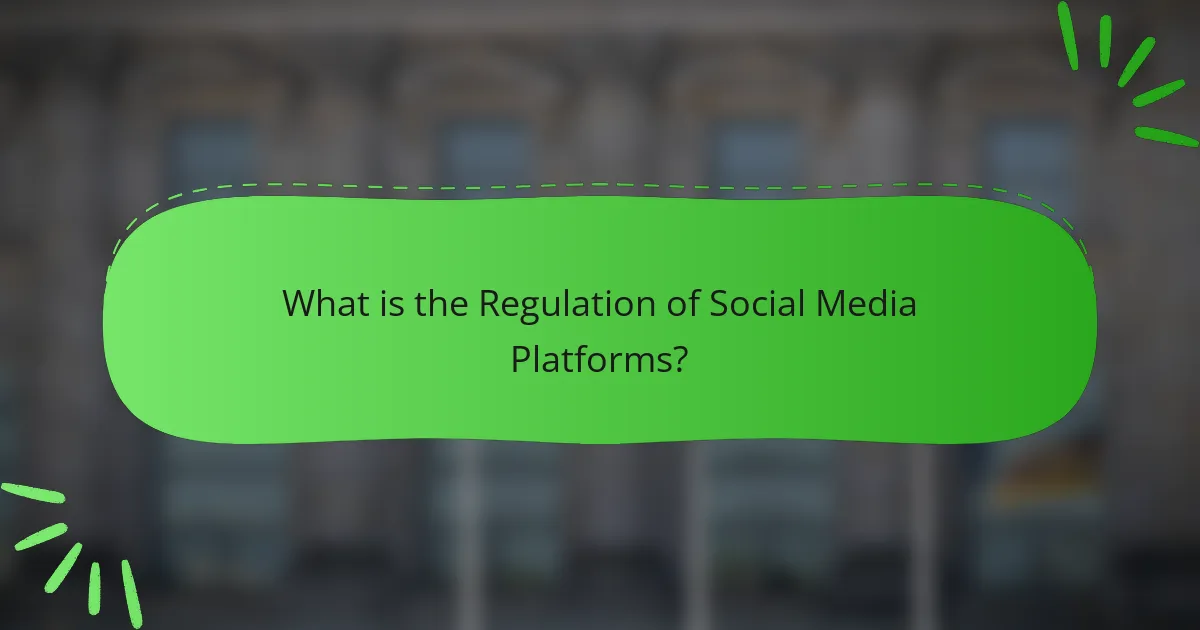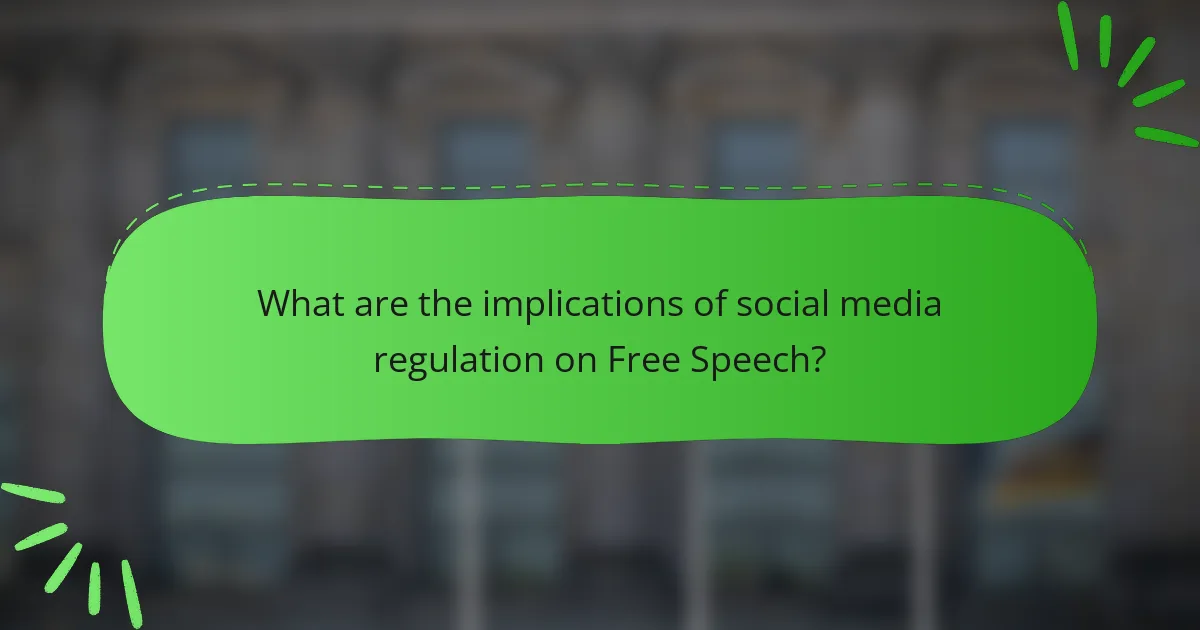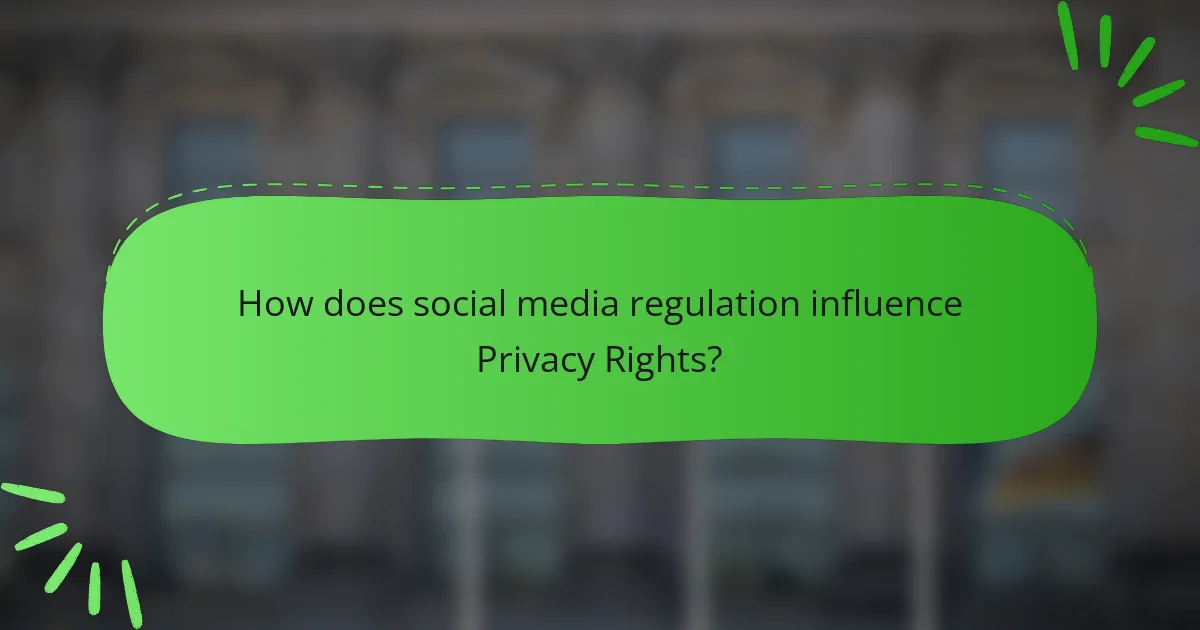Regulation of social media platforms encompasses the legal frameworks that govern their operations, focusing on user safety, data privacy, and content moderation. These regulations, implemented by governments globally, aim to combat issues such as misinformation and hate speech while ensuring transparency in data usage and user consent. The article examines the impact of these regulations on free speech, highlighting the tension between protecting individuals from harmful content and allowing for open expression. Additionally, it explores how regulations like the General Data Protection Regulation (GDPR) enhance privacy rights by mandating user consent and promoting accountability in data handling practices. Overall, the discussion underscores the complex relationship between social media regulation, free speech, and privacy rights.

What is the Regulation of Social Media Platforms?
Regulation of social media platforms refers to the legal frameworks governing their operations. These regulations aim to ensure user safety, data privacy, and content moderation. Governments worldwide implement these regulations to address issues like misinformation and hate speech. For example, the European Union’s Digital Services Act establishes rules for online platforms to combat harmful content. Regulations also mandate transparency in data usage and user consent. Studies show that effective regulation can enhance user trust in social media services. Additionally, compliance with these regulations can impact how platforms manage user-generated content.
How do regulations impact social media operations?
Regulations significantly impact social media operations by enforcing compliance with legal standards. These regulations dictate how platforms manage user data, content moderation, and advertising practices. For instance, the General Data Protection Regulation (GDPR) in Europe mandates strict data privacy measures. This affects how companies collect, store, and use personal information. Additionally, regulations can influence content moderation policies to curb hate speech and misinformation. Social media companies must implement systems to monitor and remove harmful content. Failure to comply can result in hefty fines and legal repercussions. Overall, regulations shape the operational framework within which social media platforms function.
What are the key regulatory frameworks governing social media?
The key regulatory frameworks governing social media include the General Data Protection Regulation (GDPR) and the Digital Services Act (DSA) in Europe. The GDPR, effective since May 2018, sets strict guidelines for data protection and privacy for individuals within the European Union. It mandates consent for data collection and imposes heavy fines for non-compliance. The DSA, implemented in 2022, focuses on the responsibilities of online platforms in content moderation and user safety. It requires transparency in algorithmic processes and accountability for harmful content.
In the United States, Section 230 of the Communications Decency Act provides immunity to social media platforms from liability for user-generated content. This framework has been pivotal in shaping the landscape of free speech online. However, it has faced scrutiny and calls for reform due to concerns over misinformation and hate speech.
Other notable regulations include the Children’s Online Privacy Protection Act (COPPA), which protects the privacy of children under 13, and various state-level laws addressing data breaches and consumer privacy. These frameworks collectively influence how social media platforms operate and balance user rights with regulatory compliance.
How do these regulations vary across different countries?
Regulations of social media platforms vary significantly across different countries. In the United States, regulations emphasize free speech under the First Amendment. This leads to limited government intervention in social media content moderation. In contrast, countries like Germany enforce strict laws against hate speech, requiring platforms to remove such content swiftly. The European Union has introduced the Digital Services Act, imposing extensive obligations on social media companies regarding user privacy and content accountability. Meanwhile, countries like China implement stringent censorship laws, allowing the government to control and monitor social media activity heavily. Each country’s legal framework reflects its cultural values and political priorities, resulting in diverse approaches to social media regulation.
Why is the regulation of social media platforms important?
The regulation of social media platforms is important to ensure user safety and protect privacy rights. These platforms can facilitate the spread of misinformation and harmful content. Regulation helps to mitigate such risks by enforcing guidelines on content moderation. It also promotes transparency regarding data collection practices. For instance, the General Data Protection Regulation (GDPR) in Europe mandates strict data handling protocols. This regulation empowers users to control their personal information. Furthermore, it holds companies accountable for data breaches. Overall, regulation fosters a safer online environment and upholds democratic values.
What role do social media platforms play in modern communication?
Social media platforms serve as primary channels for modern communication. They facilitate real-time interaction among users globally. Platforms like Facebook, Twitter, and Instagram enable sharing of information, news, and personal updates. This instant connectivity fosters community engagement and dialogue. According to a Pew Research study, 72% of adults use social media to connect with others. Social media also influences public opinion and mobilizes social movements. The platforms provide a space for diverse voices, enhancing democratic discourse. However, they also raise concerns about privacy and misinformation, necessitating regulation.
How do regulations aim to protect users and society?
Regulations aim to protect users and society by establishing guidelines that govern behavior on social media platforms. These regulations address issues such as misinformation, harassment, and data privacy. They require platforms to implement measures that safeguard user data and promote transparency. For example, the General Data Protection Regulation (GDPR) enforces strict rules on data collection and user consent. This regulation empowers users by giving them control over their personal information. Additionally, regulations can impose penalties on companies that fail to comply, ensuring accountability. Such measures contribute to a safer online environment and foster trust among users.

What are the implications of social media regulation on Free Speech?
Social media regulation can significantly impact free speech. Regulations may impose restrictions on content moderation and user expression. For instance, laws aimed at curbing hate speech can limit users’ ability to share controversial opinions. In contrast, such regulations can also protect individuals from harmful speech. The balance between regulation and free speech is complex. Countries like Germany have enacted laws that require platforms to remove illegal content swiftly. This has led to concerns about over-censorship and the chilling effect on legitimate discourse. Research indicates that excessive regulation can stifle public debate and dissent. The implications of social media regulation on free speech are ongoing and multifaceted.
How do regulations affect users’ freedom of expression?
Regulations can limit users’ freedom of expression by imposing restrictions on content. These restrictions may include bans on hate speech, misinformation, and harmful content. Such regulations aim to protect public safety and prevent harm. However, they can also lead to censorship and the suppression of legitimate speech. For example, platforms may remove posts that violate community guidelines. This can create a chilling effect, where users self-censor to avoid penalties. Studies show that over-regulation can stifle diverse viewpoints. Ultimately, regulations must balance safety and free expression to avoid infringing on users’ rights.
What are the potential risks of over-regulation on free speech?
Over-regulation on free speech can lead to censorship and suppression of diverse viewpoints. When regulations become too stringent, individuals may self-censor to avoid penalties. This stifles open dialogue and public discourse. Over-regulation can also disproportionately affect marginalized voices. Historically, laws that limit speech have been used to target dissenters. Additionally, over-regulation may create an environment of fear, discouraging people from expressing their opinions. In extreme cases, it can lead to authoritarian practices where only approved narratives are allowed. The balance between regulation and free expression is critical to maintain a healthy democratic society.
How do platforms balance regulation with user expression?
Platforms balance regulation with user expression by implementing content moderation policies. These policies aim to comply with legal requirements while allowing diverse viewpoints. They often use algorithms and human moderators to enforce community guidelines. This dual approach helps mitigate harmful content without stifling free speech. For example, platforms may remove hate speech but allow political discourse. Transparency reports provide insight into moderation practices. Studies show that clear guidelines improve user trust and engagement. Overall, platforms strive to create safe environments while respecting user rights.
What are the arguments for and against regulating free speech on social media?
Arguments for regulating free speech on social media include preventing hate speech and misinformation. Regulation can protect vulnerable communities from online harassment. It can also maintain the integrity of public discourse by reducing the spread of false information. Studies show that misinformation can influence elections and public health decisions.
Arguments against regulating free speech on social media focus on the potential for censorship. Critics argue that regulation may infringe on individual rights to express opinions. They worry about the subjective nature of content moderation. Some believe that regulation could lead to a slippery slope of increased government control over speech. Historical examples show that censorship can stifle dissent and limit democratic engagement.
What concerns do advocates of free speech raise?
Advocates of free speech raise concerns about censorship and restrictions on expression. They argue that regulation can lead to the suppression of diverse viewpoints. This suppression may disproportionately affect marginalized groups who rely on social media for visibility. Advocates also worry about the subjective nature of content moderation. Decisions made by platforms can be inconsistent and opaque. Furthermore, there is a fear that regulations may stifle innovation and open discourse. Historical examples show that overly broad regulations can lead to unintended consequences. For instance, the chilling effect on speech can discourage individuals from expressing dissenting opinions. These concerns highlight the delicate balance between regulation and the protection of free speech.
What justifications do supporters of regulation provide?
Supporters of regulation argue that it is necessary to protect users from harmful content. They assert that regulation can reduce misinformation and hate speech on social media platforms. Evidence shows that unregulated platforms often allow the spread of false information, which can lead to real-world consequences. Additionally, supporters claim that regulation enhances user privacy by enforcing data protection standards. Studies indicate that stronger regulations can lead to improved data security for users. They also believe regulation fosters accountability among social media companies. This accountability can lead to more responsible behavior in content moderation and user data handling.

How does social media regulation influence Privacy Rights?
Social media regulation significantly influences privacy rights by establishing legal frameworks that protect user data. Regulations like the General Data Protection Regulation (GDPR) in Europe mandate that social media platforms obtain user consent before collecting personal information. This empowers users to control their data and enhances their privacy rights. Furthermore, regulations often require transparency in data handling practices, compelling platforms to inform users about data usage. Research indicates that stricter regulations lead to improved data protection measures, reducing incidents of data breaches. For instance, a study by the European Commission found that GDPR compliance has led to a 25% decrease in data breach notifications. Thus, social media regulation directly strengthens privacy rights by enforcing accountability and user control over personal information.
What privacy concerns arise from social media usage?
Privacy concerns from social media usage include data collection, surveillance, and unauthorized sharing of personal information. Social media platforms collect vast amounts of user data, including location, preferences, and interactions. This data can be used for targeted advertising, often without explicit user consent. Surveillance by third parties can occur through tracking user activity across different platforms. Additionally, data breaches can expose sensitive information to malicious actors. Research indicates that 81% of Americans feel they have little control over the data collected by social media companies. These privacy issues raise significant concerns about user autonomy and security in the digital age.
How do regulations seek to enhance user privacy?
Regulations enhance user privacy by establishing legal frameworks that protect personal data. These frameworks often require companies to obtain user consent before collecting data. Regulations also mandate transparency in data usage and storage practices. For instance, the General Data Protection Regulation (GDPR) enforces strict guidelines on data handling across the EU. Companies must inform users about their rights regarding data access and deletion. Additionally, regulations impose penalties for data breaches, incentivizing better security measures. Overall, these regulations aim to empower users and safeguard their personal information.
What are the challenges in enforcing privacy regulations?
Enforcing privacy regulations faces several challenges. One significant challenge is the rapid evolution of technology. New platforms and tools often outpace existing regulations. This creates gaps in legal coverage. Another challenge is the lack of uniformity in regulations across jurisdictions. Different regions have varying laws, complicating compliance for global companies. Additionally, there is often insufficient funding and resources for regulatory bodies. This limits their ability to monitor and enforce regulations effectively. Furthermore, many users lack awareness of their privacy rights. This can lead to non-compliance and exploitation. Lastly, the complexity of data flows makes it difficult to trace breaches. These factors collectively hinder the enforcement of privacy regulations.
How do users perceive their privacy rights on social media platforms?
Users perceive their privacy rights on social media platforms as often compromised. Many feel that their personal information is not adequately protected. A survey by Pew Research Center found that 81% of users believe they have little to no control over their data. Additionally, 79% of users express concern over how their data is used by companies. Users frequently report feeling uncomfortable with targeted advertising based on their online behavior. Privacy policies are often deemed confusing and not user-friendly. This leads to a lack of trust in social media platforms regarding data security. Overall, users demand clearer privacy protections and more transparency from these platforms.
What factors influence user trust in social media privacy practices?
User trust in social media privacy practices is influenced by transparency, data handling, and user control. Transparency involves clear communication about data collection and usage. Users are more likely to trust platforms that openly disclose their privacy policies. Data handling refers to how securely and responsibly user information is managed. Breaches or misuse of data can significantly diminish trust. User control allows individuals to manage their privacy settings effectively. Platforms that empower users to customize their privacy preferences tend to foster greater trust. Studies show that 70% of users are more likely to trust platforms with robust privacy controls.
How can users protect their privacy while using social media?
Users can protect their privacy while using social media by adjusting privacy settings. Most platforms offer options to control who can see posts and personal information. Users should enable two-factor authentication to add an extra layer of security. It is important to be cautious about friend requests and only connect with known individuals. Users should avoid sharing sensitive personal information publicly. Regularly reviewing and updating privacy settings helps maintain control over data. Additionally, using strong, unique passwords for accounts reduces the risk of unauthorized access. According to a 2021 survey by the Pew Research Center, 81% of Americans feel they have little to no control over the data collected by social media platforms. This highlights the importance of proactive privacy measures.
What are best practices for navigating social media regulations?
Best practices for navigating social media regulations include understanding the specific laws applicable to your region. Familiarize yourself with data protection laws like GDPR in Europe or CCPA in California. Regularly review platform-specific guidelines to ensure compliance. Implement robust privacy policies that align with legal requirements. Train your team on compliance and the implications of regulations. Monitor changes in legislation to adapt your strategies accordingly. Document all processes related to data handling and user interactions. Engaging legal counsel can provide tailored advice for complex situations.
The main entity of this article is the regulation of social media platforms, which encompasses legal frameworks designed to govern their operations, ensuring user safety, data privacy, and content moderation. The article examines the impact of these regulations on social media operations, highlighting key frameworks like the General Data Protection Regulation (GDPR) and the Digital Services Act (DSA). It also explores the implications of regulation on free speech and privacy rights, discussing how varying international approaches affect user expression and trust. Additionally, the article addresses the challenges of enforcing privacy regulations and the perceptions of users regarding their rights on social media platforms.